现代大学生英语 diogenes第欧根尼 戴奥真尼斯 犬儒主义28页PPT
现代大学英语精读第二版book3unit4
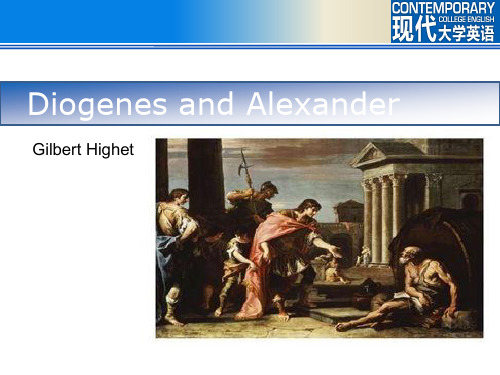
Text Analysis
Character Analysis
Diogenes: the philosopher (para. 4)
1. “A Socrates gone mad”:
repositioning of convention below nature and reason 2. • • • Three key principles: living in accord with nature total disregard of convention independence (freedom) being the only true, lasting good
Warming up
1. Content:
Objectives
• differences and similarities between Diogenes and Alexander • Cynicism and its present significance • philosopter Analysis
Diogenes: the missionary (para. 5)
1.
•
Comparison with ordinary hermits
Similarities: Both grew tired of human society with its complications and wanted to live simply.
Background
Alexander
• Macedonian King: son of Philip
• The Thinker: student of Aristotle • The Conqueror: Greece, Asia, Egypt
犬儒主义(英文版)
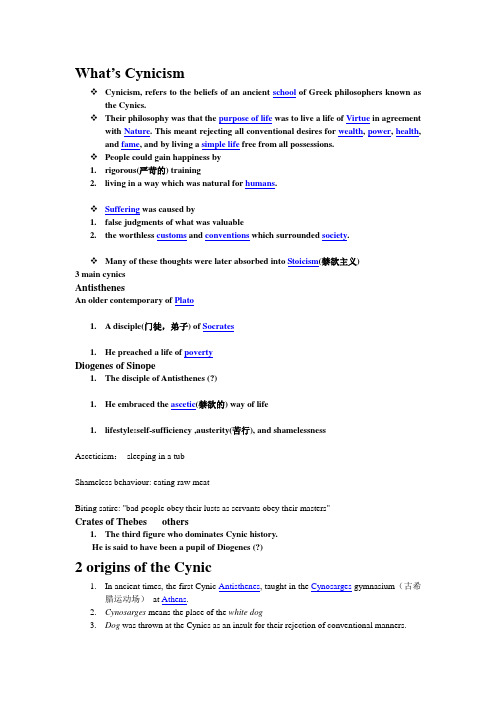
What’s CynicismCynicism, refers to the beliefs of an ancient school of Greek philosophers known as the Cynics.Their philosophy was that the purpose of life was to live a life of Virtue in agreement with Nature. This meant rejecting all conventional desires for wealth, power, health, and fame, and by living a simple life free from all possessions.People could gain happiness by1.rigorous(严苛的) training2.living in a way which was natural for humans.Suffering was caused by1.false judgments of what was valuable2.the worthless customs and conventions which surrounded society.Many of these thoughts were later absorbed into Stoicism(禁欲主义)3 main cynicsAntisthenesAn older contemporary of Plato1. A disciple(门徒,弟子) of Socrates1.He preached a life of povertyDiogenes of Sinope1.The disciple of Antisthenes (?)1.He embraced the ascetic(禁欲的) way of life1.lifestyle:self-sufficiency ,austerity(苦行), and shamelessnessAsceticism:sleeping in a tubShameless behaviour: eating raw meatBiting satire: "bad people obey their lusts as servants obey their masters"Crates of Thebes others1.The third figure who dominates Cynic history.He is said to have been a pupil of Diogenes (?)2 origins of the Cynic1.In ancient times, the first Cynic Antisthenes, taught in the Cynosarges gymnasium(古希腊运动场)at Athens.2.Cynosarges means the place of the white dog3.Dog was thrown at the Cynics as an insult for their rejection of conventional manners.4.Diogenes, states "other dogs bite their enemies, I bite my friends to save them."4 reasons for why the Cynics are so named1 The indifference of their way of life, like dogs, eat and go barefoot in public.2The dog is a shameless animal, and they make a cult(膜拜,崇拜) of shamelessness3The dog is a good guard, and they guard the tenets(宗旨,原则)of their philosophy4The dog is a discriminating animal which can distinguish between its friends and enemiesFundamental principles1The goal of life is happiness which is to live in agreement with Nature2Happiness depends on being self-sufficient, and a master of mental attitude3Self-sufficiency is achieved by living a life of virtue4The road to virtue is to free oneself fromany influence like wealth, fame, or power5Suffering is caused by false judgments of valueCynicism in the Roman WorldThere is little record of Cynicism in the 2nd or 1st centuries BCE(公元前)By the 1st century CE, Cynicism reappeared with full force.The rise of Imperial Rome may have led to a sense of powerlessness and frustration among many people, which allowed a philosophy which emphasized self-sufficiency and inner-happiness to flourish once again.Cynicism and ChristianitySome scholars have argued that the Q document,the hypothetical(假设的) common source for the gospels(福音)of Matthew(马太)and Luke(路可),has strong similarities with the teachings of the Cynics.Other scholars doubt that Jesus was deeply influenced by the Cynics, and see the Jewish prophetic(预言的) tradition as of much greater importance1.Many of the ascetic (苦行的)practices of Cynicism may have been adopted byearly Christians.1.The ascetic orders of Christianity also had direct connection with the Cynics,and in many of their practices were little different from the Cynics of an earlier agecontemporaryBy the 19th century, emphasis on the negative aspects of Cynic philosophy led to the modern understanding of cynicism to mean——An attitude of scornful negativity, especially a general distrust of the sincerity or goodness of human motives and actionsIt can manifest itself as a result of frustration, disillusionment, and distrust perceived as due to organizations, authorities and other aspects of societySocial Effects of CynicismThe cynicism of Diogenes☐artificial growths of society were incompatible with happiness☐morality implies a return to the simplicity of nature☐"Humans have complicated every simple gift of the gods.“☐"cosmopolitan”☐Scorned family; political social organization; property rights; reputation.The ideal Cynic would evangelise:hound people about the error of their ways (watchdog of humanity)expose the pretensions which lay at the root of everyday conventionsPositive effectsTraditional cynicism is a worthy and even noble world-view -- up to a point.●rare opportunity to live in harmony with your values●freedom from self-deception●immunity against faddish "groupthink"●development of an independent, contrarian mind and spirit●introspect the pursuit of fame and fortuneNegative effects•First, cynicism points to the unintended consequences of actions and derides our belief in our ability to rationally assess those consequences or plan for them.•Second, it attacks the stability of institutions•Third, it recasts valued political conceptsEnsemble effect•Different types of cynicism that interact in an "ensemble effect," composed of master-cynic, insiders, and powerless public.•master-cynic•Insiders•powerless publicModern attitude•First,see it critically•Second,make full use of Positive Cynicism: keep our integrity without being miserable•Reject what you can tolerate,Reward yourself by loving something with a passion.1.the fundamental principles of Cynicism● 1.The goal of life is happiness which is to live in agreement with Nature.● 2.Happiness depends on being self-sufficient, and a master of mental attitude.● 3.The road to virtue is to free oneself from any influence such as wealth, fame, or power,which have no value in Nature.2. History of Cynicism1. Origin of the Cynic name---doggishness•from Ancient Greek κυνικός(kynikos), meaning "dog-like•the first Cynic, Antisthenes, taught in the Cynosarges gymnasium at Athens. The word Cynosarges means the place of the white dog。
Diogenes

In Athens
Diogenes arrived in Athens with a slave named Manes who abandoned him
shortly thereafter(其后). Diogenes
would mock such a relation of extreme dependency. He found the figure of a
After being exiled from [放逐] his native city for defacing the currency(造假币), he moved to Athens to debunk [揭穿] cultural conventions. Diogenes modelled
Several anecdotes(奇闻轶事)
He often wore a coarse cloak(粗斗 篷), carried a wallet and a stick, made the porticoes(门廊)and other public places his habitation, and depended upon casual contributions for his daily bread. He asked a friend to get him a cell to live in; when there was a delay, he took up abode(住处) in a large cask( 木桶 )or storage jar discarded(丢弃) by others, It is probable that this was only a temporary expression of indignation(愤慨 )and contempt(蔑 视), and that he did not make it the settled place of his residence(住处) . He just did it by choice, out of his
Cynicism (犬儒主义)
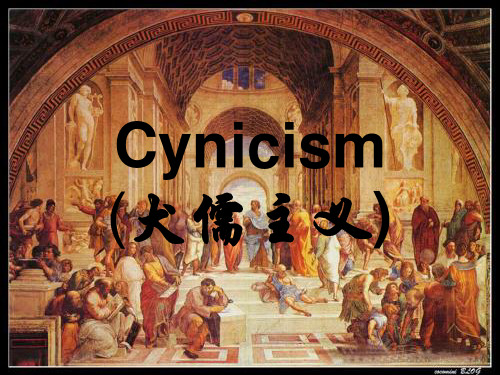
VI. Cynicism and Christianity
Historical Jesus as a Jewish Cynic:
Some historians have noted the similarities between the life and teachings(教义 ) of (教义) Jesus and those of the Cynics. Some scholars have argued that the Q document( the hypothetical common source for the gospels of Matthew and Luke) has strong similarities with the teachings of the Cynics. Other scholars doubt that Jesus was deeply influenced by the Cynics, and see the Jewish prophetic(预言的) tradition as of (预言的) much greater importance.
There are four reasons why the Cynics are so named:
First because of the indifference of their way of life, for they make a cult (狂热崇拜;迷信)of indifference and, like dogs, eat and make love in public, go barefoot, and sleep in tubs and at crossroads. The second reason is that the dog is a shameless animal, and they make a cult of shamelessness, not as being beneath modesty, but as superior to it. The third reason is that the dog is a good guard, and they guard the tenets(宗旨;原则) of their philosophy. The fourth reason is that the dog is a discriminating (有辨别力的)animal which can distinguish between its friends and enemies. So do they recognize as friends those who are suited to philosophy, and receive them kindly, while those unfitted they drive away, like dogs, by barking at them.
第欧根尼
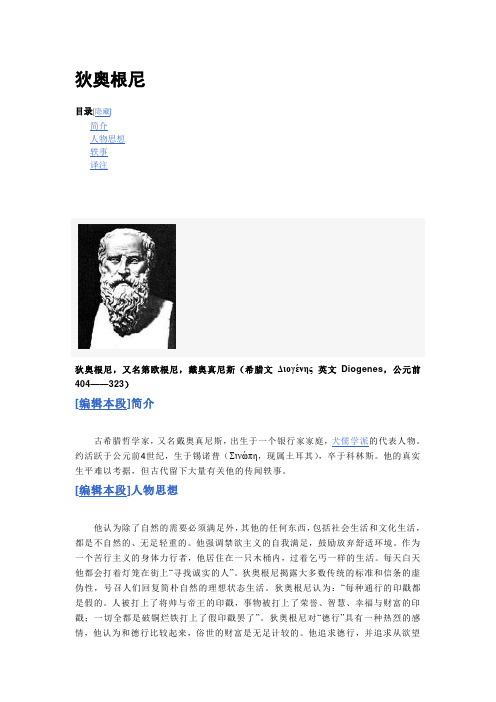
狄奥根尼目录[隐藏]简介人物思想轶事译注狄奥根尼,又名第欧根尼,戴奥真尼斯(希腊文Διογένης英文Diogenes,公元前404——323)[编辑本段]简介古希腊哲学家,又名戴奥真尼斯,出生于一个银行家家庭,犬儒学派的代表人物。
约活跃于公元前4世纪,生于锡诺普(Σινώπη,现属土耳其),卒于科林斯。
他的真实生平难以考据,但古代留下大量有关他的传闻轶事。
[编辑本段]人物思想他认为除了自然的需要必须满足外,其他的任何东西,包括社会生活和文化生活,都是不自然的、无足轻重的。
他强调禁欲主义的自我满足,鼓励放弃舒适环境。
作为一个苦行主义的身体力行者,他居住在一只木桶内,过着乞丐一样的生活。
每天白天他都会打着灯笼在街上“寻找诚实的人”。
狄奥根尼揭露大多数传统的标准和信条的虚伪性,号召人们回复简朴自然的理想状态生活。
狄奥根尼认为:“每种通行的印戳都是假的。
人被打上了将帅与帝王的印戳,事物被打上了荣誉、智慧、幸福与财富的印戳;一切全都是破铜烂铁打上了假印戳罢了”。
狄奥根尼对“德行”具有一种热烈的感情,他认为和德行比较起来,俗世的财富是无足计较的。
他追求德行,并追求从欲望之下解放出来的道德自由:只要你对于幸运所赐的财货无动于衷,便可以从恐惧之下解放出来。
后来他师承苏格拉底的弟子安提斯泰尼,以身作则发扬了老师的“犬儒哲学”,试图颠覆一切传统价值。
他从不介意别人称呼他为“狗”,他甚至高呼“像狗一样活着”。
人们把他们的哲学叫做“犬儒主义”(Cynicism)。
他的哲学思想为古希腊崇尚简朴的生活理想奠定了基础。
归到他名下但现已失传的各种著作中,有对话、戏剧和一部《共和国》,该书描绘无政府主义者的乌托邦,人们在其中过着“自然”的生活。
[编辑本段]轶事狄奥根尼和亚历山大的故事据说狄奥根尼住在一个木桶里,所拥有的所有财产包括这个木桶、一件斗篷、一支棍子、一个面包袋。
有一次亚历山大大帝访问他,问他需要什么,并保证会兑现他的愿望。
犬儒主义
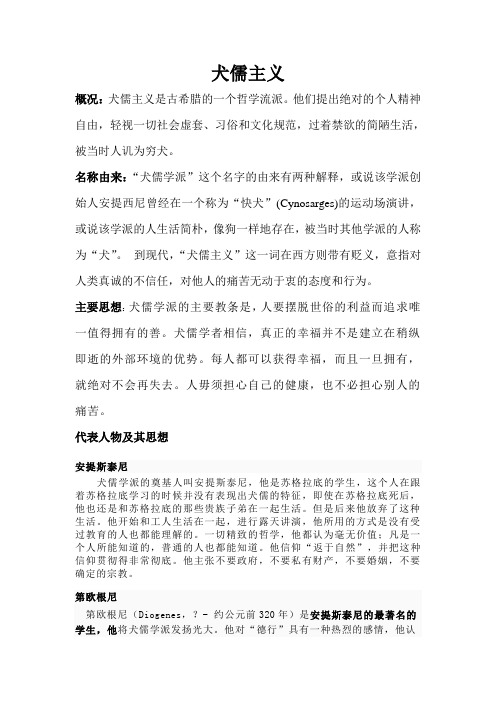
犬儒主义概况:犬儒主义是古希腊的一个哲学流派。
他们提出绝对的个人精神自由,轻视一切社会虚套、习俗和文化规范,过着禁欲的简陋生活,被当时人讥为穷犬。
名称由来:“犬儒学派”这个名字的由来有两种解释,或说该学派创始人安提西尼曾经在一个称为“快犬”(Cynosarges)的运动场演讲,或说该学派的人生活简朴,像狗一样地存在,被当时其他学派的人称为“犬”。
到现代,“犬儒主义”这一词在西方则带有贬义,意指对人类真诚的不信任,对他人的痛苦无动于衷的态度和行为。
主要思想:犬儒学派的主要教条是,人要摆脱世俗的利益而追求唯一值得拥有的善。
犬儒学者相信,真正的幸福并不是建立在稍纵即逝的外部环境的优势。
每人都可以获得幸福,而且一旦拥有,就绝对不会再失去。
人毋须担心自己的健康,也不必担心别人的痛苦。
代表人物及其思想安提斯泰尼犬儒学派的奠基人叫安提斯泰尼,他是苏格拉底的学生,这个人在跟着苏格拉底学习的时候并没有表现出犬儒的特征,即使在苏格拉底死后,他也还是和苏格拉底的那些贵族子弟在一起生活。
但是后来他放弃了这种生活。
他开始和工人生活在一起,进行露天讲演,他所用的方式是没有受过教育的人也都能理解的。
一切精致的哲学,他都认为毫无价值;凡是一个人所能知道的,普通的人也都能知道。
他信仰“返于自然”,并把这种信仰贯彻得非常彻底。
他主张不要政府,不要私有财产,不要婚姻,不要确定的宗教。
第欧根尼第欧根尼(Diogenes,?- 约公元前320年)是安提斯泰尼的最著名的学生,他将犬儒学派发扬光大。
他对“德行”具有一种热烈的感情,他认为和德行比较起来,俗世的财富是无足计较的。
他追求德行,并追求从欲望之下解放出来的道德自由:只要你对于幸运所赐的财货无动于衷,便可以从恐惧之下解放出来现代犬儒主义现代犬儒主义是一种“以不相信来获得合理性”的社会文化形态。
现代犬儒主义的彻底不相信表现在它甚至不相信还能有什么办法改变它所不相信的那个世界。
犬儒主义把对现有秩序的不满转化为一种不拒绝的理解,一种不反抗的清醒和一种不认同的接受。
犬儒学派
犬儒主义(Cynicism)是个外来词,中文里本来没有现成的对应词汇,通常将它理解为讥诮嘲讽,愤世嫉俗, 玩世不恭。
犬儒主义是古希腊的一个哲学流派,其代表人物是西诺普的狄奥根尼。这派哲学主张清心寡欲,鄙弃俗世的 荣华富贵,力倡回归自然(这使人想起老庄哲学,想起某些魏晋名士)。据说狄奥根尼本人住在一个桶里(又有 一说是住在瓮里),以讨饭为生。有人讥笑他活得象条狗,他却不恼。“犬儒”之称由此得名。关于狄奥根尼, 有段故事很著名,一天,亚历山大御驾亲临,前来探望正躺在地上晒太阳的狄奥根尼,问他想要什么恩赐;狄奥 根尼回答说:“只要你别挡住我的太阳。
学派创立
安提斯泰尼在晚年对正统的哲学丧失了信心,当他已不再年轻,鄙弃从前所重视的东西,放弃了上层阶级的 生活模式,而去过简朴的生活,不受各种习俗和规定的限制,除了纯朴的善良而外,他不愿意要任何东西,并希 望希腊回复到原始社会。
受到这种思想的启发,狄奥根尼(安提斯泰尼的弟子)几乎裸身并且没有携带任何补给便周游了整个希腊, 享受了阳光、温暖等一切自然的恩赐,并且聚集了几千个皈依他的思想的人,并向他们讲述这个社会是多么值得 讽刺。
背景介绍
犬儒犬儒学派因其创始人安提斯泰尼(Antisthenes)在一个名叫居诺萨格(Kunosarges)的体育场中讲学 而得名。因为Kuno就是希腊语“狗”的意思。同时,“犬儒”这名称也标志着他们的生活方式。准确的来说,犬 儒学派就是对世界的不信任和对任何事物抱消极态度的学派。
安提斯泰尼是苏格拉底的弟子,约长于柏拉图二十岁。安提斯泰是一个非常引人注意的人物,在某些方面其 有似于托尔斯泰。直到苏格拉底死后,他还生活在苏格拉底贵族弟子们的圈子里,并没有表现出任何非正统的征 象来。
大学英语(四)DiogenesandAlexander戴奥吉尼斯和亚历山大
大学英语(四)DiogenesandAlexander戴奥吉尼斯和亚历山大Diogenes and Alexander 戴奥吉尼斯和亚历山大The Dog Has His DayGilbert HighetThis article by the late classicist Gilbert Highet describes a meeting between two sharply contrasting personalities of history: Alexander the Great and Diogenes. This selection originally appeared in Horizon, the first in a series entitled Great Confrontations.此文是由晚期著名的古典学者Gilbert Highet 所写,描述了历史上两位性格极端伟大人物的会面场面:亚历山大国王和戴奥吉尼斯。
本文选择来自Horizon,一篇名叫“伟大的会面”的开始部分。
Lying on the bare earth, shoeless, bearded, half-naked, he looked like a beggar or a lunatic(神经病,疯子). He was one, but not the other. He had opened his eyes with the sun at dawn (拂晓), scratched, done his business like a dog at the roadside, washed at the public fountain, begged a piece of breakfast bread and a few olives, eaten them squatting on the ground, and washed them down with a few handfuls of water scooped from the spring. (Long ago he had owned a rough wooden cup, but he threw it away when he saw a boy drinking out of his hollowed hands.) Having no work to go to and no family to provide for, he was free. As the market place filled up with shoppers and merchants and gossipers and sharpers (a cheater, esp. a cardsharper) and slaves and foreigners, he had strolled through it for an hour or two. Everybody knew him, or knew of him. They would throw sharp questions at him and get sharper answers. Sometimes they threw jeers, and got jibes; sometimes bits offood, and got scant thanks; sometimes a mischievous pebble, and got a shower of stones and abuse(漫骂). They were not quite sure whether he was mad or not. He knew they were mad, all mad, each in a different way; they amused him. Now he was back at his home. (周围的人们不能肯定他到底是不是真的疯了,但是他确是非常的肯定他们是真的疯了,以不同的方式和程度; 这个发现使他很开心好玩).It was not a house, not even a squatter's hut. He thought everybody lived far too elaborately, expensively, anxiously. What good is a house? No one needs privacy: natural acts are not shameful; we all do the same thing, and need not hide them. No one needs beds and chairs and such furniture: the animals live healthy lives and sleep on the ground. All we require, since nature did not dress us properly, is one garment to keep us warm, and some shelter from rain and wind. So he had one blanket—to dress him in the daytime and cover him at night—and he slept in a cask. His name was Diogenes. He was the founder of the creed called Cynicism (the word means "doggishness"); he spent much of his life in the rich, lazy, corrupt Greek city of Corinth, mocking and satirizing its people, and occasionally converting one of them.His home was not a barrel made of wood: too expensive. It was a storage jar made of earthenware, something like a modern fuel tank—no doubt discarded because a break had made it useless. He was not the first to inhabit such a thing: the refugees driven into Athens by the Spartan invasion had been forced to sleep in casks. But he was the first who ever did so by choice, out of principle.Diogenes was not a degenerate or a maniac(疯子). He was a philosopher who wrote plays and poems and essaysexpounding(解释) his doctrine; he talked to those who cared to listen; he had pupils who admired him. But he taught chiefly by example. All should live naturally, he said, for what is natural is normal and cannot possibly be evil or shameful. Live without conventions, which are artificial and false; escape complexities and superfluities and extravagances: only so can you live a free life. The rich man believes he possesses his big house with its many rooms and its elaborate furniture, his pictures and expensive clothes, his horses and his servants and his bank accounts. He does not. He is their slave. In order to procure a quantity of false, perishable goods he has sold the only true, lasting good, his own independence. (富人们都相信, 拥有了属于自己的豪华大房子,房间很多,装饰和家具都很精致和气派, 还有很多的名画和很昂贵的衣服, 马匹和佣人,还有银行账户上的很多的钱。
犬儒学派
苏格拉底的这句话作为犬儒学派哲学的注解 最好不过。 犬儒学派提倡生活简朴,节制自己的欲望, 要想狗一样活着。
Zhaoshenglei
苏格拉底曾说过,德行就是知识。
犬儒主义者说,美德就是要知道如何控制自
己的欲望,能控制自己欲望的人就是有道德 的人,反之。
为了做个有道德的人,犬儒主义 者们提倡回归自然,鄙弃世利; 要求克制人的欲望,独善其身。
↗
Zhaoshenglei
犬儒主义者们主张哲学家要对诸如名、利、
苦、乐等采取漠不关心态度。 安提斯太纳曾就对当时哲学失去信心,放弃 了上层阶级生活模式,过起了自己向往的自 然生活,并希望希腊回复到原始社会,而不 受各种习俗和规定的限制。
Zhaoshenglei
犬儒主义者们还相信,真正的幸福不是建立
犬儒学派
赵胜磊
Zhaoshenglei
创立人:安提斯太纳(Antisthenes)(苏格拉
底的学生之一)。
安提斯太纳的母亲是个奴隶,早年得到机会
跟从苏格拉底学习哲学。苏格拉底死后他便 住在快犬健身房内。犬儒学派因此得名。
Zhaoshenglei
“这些东西中有太多是我根本不需要的啊!”
Zhaoshenglei
前期(第欧根尼与他的木桶)与后期(德勒
斯与富人)各有一个故事,在这里我就不细 说了,有兴趣的同学可以找我做深入了解哦!
Zhaoshenglei
王尔德曾讽刺说:“犬儒主义者们对各种事
物价钱一清二楚,但对它们的价值一无所 知。”
Zhaoshenglei
这真是“犬儒主义”的悲哀。
哎!
Zhaoshenglei
我所叙述只是犬儒学派基本思想中沧海一粟,
第欧根尼
第欧根尼far as ,。
收到信后,马不停蹄地从马其顿的首府派拉来到科林斯看望第欧根尼。
初冬的上午,日上三竿。
科林斯的大街,第欧根尼倚靠在他的泥桶上享受日光浴,这是他每天的必修课。
亚历山大带领他的扈从来到第欧根尼的泥桶边,对着第欧根尼朗声道:我是马其顿的亚历山大。
第欧根尼头也不回,懒懒的说:我是第欧根尼亚历山大帝躬身说:请问先生,有什么我能效劳您,尽管吩咐。
第欧根尼用他的小木棍指了指地上的阴影,说道:能,劳驾您高抬贵脚,你挡住了我的阳光。
第欧根尼(only to stand out ofmy light)亚历山大帝站到一旁,过了一会,若有所思的说:如果我不是亚历山大,我愿是第欧根尼。
第欧根尼撇撇嘴,说道:如果是我,肯定的是我仍然是做第欧根尼。
做第欧根尼是如此的简单,走过来,脱下你的盔甲,躺下来,在我身边,我们一起享受阳光。
忘掉过去,丢掉未来。
没有人能阻拦你。
亚历山大笑了笑,他说:U Rright--但现在时机还不成熟。
这个世界是多么的没落,须等我扭转乾坤,等到那一天我也愿意像你这样无拘无束。
第欧根尼回答道:那么那个有一天永远不会来了。
你放下还需要别的什么?为什么要去征服世界?为什么需要去做这些?亚历山大说:当我征服了全世界以后,我会来向你学习,在这河岸上坐在你的旁边。
第欧根尼说:躺下来,现在就放下,为什么要等有一天?如果是亚里士多德听到自己的最佳弟子要改换门庭的话,估计得气得吐血而亡。
因为亚里士多德教的是怎么做事,什么哲学、物理学、逻辑学、伦理学、政治学、经济学都倾囊相受,亚里士多德(Aristoltle,BC384-BC322年)在柏拉图死后辗转流亡到马其顿王国,在国王菲力二世的资助下创办了吕克昂大学,上午学哲学,下午学修辞)而第欧根尼对于人而为人,只有一个要求,那就是高贵的品质,简单的人生。
即做正直的人。
在科林斯的大街上,烈日当空,经常会看到一个拄着拐杖,打着火炬的披着个破披风的老者,逢着人就要用他的灯笼凑上去,瞧一瞧,有人就问他,你这是干什么?他回答:我想找一个的人正直的人。
